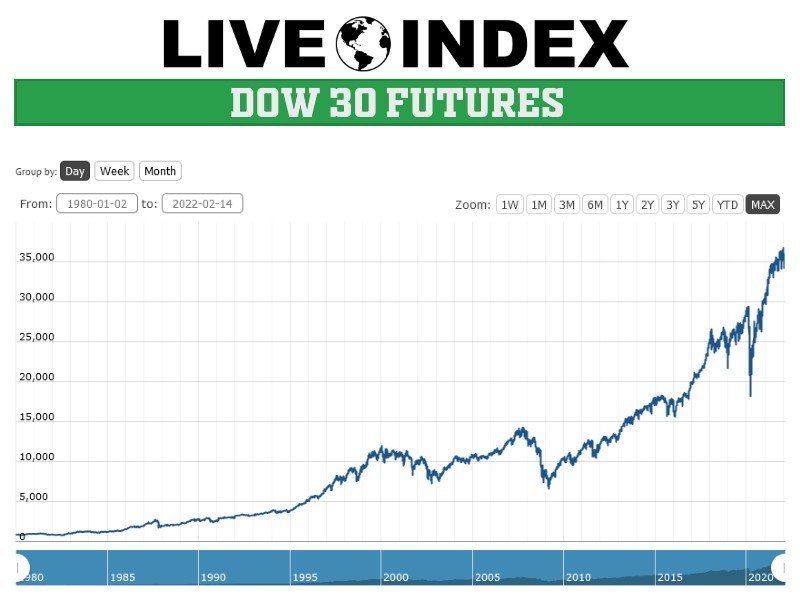Dow Futures

The Dow Jones Industrial Average (DJIA) is a widely recognized benchmark index that tracks the performance of 30 major companies in the United States. Futures contracts tied to the Dow, known as Dow Futures, provide traders and investors with a means to speculate on the future price movements of the index. Understanding Dow Futures involves delving into their intricacies, functionality, and the impact they wield in the financial markets.
Table of Contents
ToggleWhat are Dow Futures?
Dow are financial contracts that allow traders to speculate on the future value of the Dow Industrial Average. These futures contracts enable investors to take positions on the expected future direction of the index’s price, whether they anticipate a rise or fall. Trading Dow Futures involves an agreement to buy or sell the DJIA at a predetermined price and date.
Purpose and Functionality
The primary purpose of Dow is to hedge against potential market volatility and to capitalize on the index’s anticipated movements. Traders use these futures to manage risk exposure in their portfolios, as well as to seek profit opportunities based on their analysis of market trends and economic indicators.
Futures contracts come with different expiration dates, allowing traders to choose a timeframe that aligns with their market predictions. These contracts are settled at a future date, with profits or losses realized based on the difference between the contract’s price and the actual price of the Dow at the time of expiration.
Factors Influencing Dow Futures
Several factors influence the movement of Dow Futures:
- Economic Indicators: Reports on employment, inflation, GDP, and consumer sentiment significantly impact market sentiment and, consequently, the direction of Dow Futures.
- Corporate Earnings: Earnings reports of companies listed in the Dow can cause significant movements in the index, thereby affecting futures prices.
- Geopolitical Events: Events such as elections, trade agreements, geopolitical tensions, and policy changes can cause market volatility and influence Dow Futures.
- Interest Rates: Monetary policy decisions by central banks, especially the Federal Reserve in the U.S., can impact investor sentiment and consequently affect the futures market.
Trading Dow Futures
Trading Dow requires an understanding of technical analysis, fundamental analysis, and market sentiment. Technical indicators such as moving averages, relative strength index (RSI), and support/resistance levels assist traders in identifying potential entry and exit points.
Fundamental analysis involves evaluating economic data, corporate earnings, and global events to forecast the market’s direction. Combining technical and fundamental analysis helps traders make more informed decisions when trading Dow Futures.
Risk management is crucial in futures trading. Utilizing stop-loss orders and position sizing strategies helps limit potential losses and protect capital in the event of adverse market movements.
Risks Associated with Dow Futures
While Dow present opportunities for profit, they also carry inherent risks. Leverage amplifies both potential gains and losses. Traders can face substantial losses if the market moves against their position, especially if they haven’t implemented risk management strategies.
Market volatility, unexpected geopolitical events, and sudden shifts in economic conditions can lead to rapid price fluctuations, causing significant losses for traders involved in Dow Futures.
Impact on Financial Markets
Dow Futures play a crucial role in setting the tone for global financial markets. As one of the leading indices reflecting the health of the U.S. economy, movements in Dow Futures often reverberate across other indices and financial instruments worldwide. Significant price movements in Dow Futures can influence investor sentiment and guide trading decisions across various asset classes.
Conclusion
Dow Futures offer traders and investors an avenue to speculate on the future performance of the Dow Jones Industrial Average. Understanding the dynamics of these futures contracts involves analyzing economic indicators, market trends, and geopolitical events. Successful trading in Dow Futures requires a balanced approach that combines technical and fundamental analysis while implementing effective risk management strategies. Despite the potential for profits, traders should remain aware of the risks associated with futures trading. Overall, Dow Futures hold a significant position in the financial markets, impacting investor sentiment and serving as a barometer for market direction globally.





